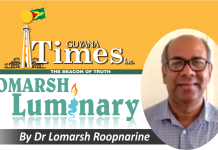Two events still linger on my mind that really prompted me to compose this column about names. The first was in grade school when one of my classmates asked me this riddle: tell me something you were given when you were little and you had no choice to say yes or no. I guessed and guessed and I gave up and she said to me, your name silly! She was right, since my first name supposed to be something else which I will discuss later in this column.
The second occurred much later in my life when the town of Skeldon, Upper Corentyne, was changed to Corriverton. I do not know why this name change occurred, but I suspect it was in tandem with sweeping trends in the developing world to domesticate or un-home the colonial experience. Skeldon rings colonial, while Corriverton reveals native. No argument here.
But I am impressed by the thought that whoever came up with the name Corriverton got to be related to the word genius in one form or the other. Corriverton is an abbreviated form of Corentyne River Town, and if you are not familiar with its formation, you would think that the word was never put together.
Now, let us push the buttons a bit further and ask how come other towns in Guyana were not renamed this way? I am confused as to why the town New Amsterdam was not renamed Beriverton after Berbice River, and Georgetown was not renamed Demriverton after the Demerara River. Okay, I know, hold your horses. Most will agree with me to retain the name Georgetown, despite the colonial heritage. My reason is to avoid the name, Guytown. When I was growing up, everything in Guyana was renamed with the word guy in it. There were official names like GuyOil, Guymine, GuySuCo and unofficial/underground names like Guyline, Guybribe, Guypolice, Guyrum, Guyticket, etc. Some of these names still exist, but I prefer the latter ones more because they speak to the unbearable reality many Guyanese experienced and supposedly overcame in the 1970s and 1980s.
I am also confused as to why the villages were given numbers as opposed to names. I understand most of the villages have original names, but they were not retained or used. Perhaps most bizarre is when the entire country was divided and labelled into regional numbers ranging from one to ten. I remember how difficult it was for me to memorise these regions in an era of political indoctrination. I doubt whether a majority of Guyanese can really recognise and describe these regions without a map.
Speaking of villages, I also remember a man in a village named Dhal Puri. I understand he went to a party and instead of breaking the Dhal Puri into pieces and then eating it, he pushed the whole thing in his mouth and choked. They had to rush him to the doctor who used a pliers to take out the whole Dhal Puri. There are also other colourful names in the villages like Sweet Wine, Crapo God, Battie Mouth, Feather, etc, which were given because of what someone had said or done. The consequence is that some will accept their imposed names and move on, but for others the new label is a sense of embarrassment and ridicule. Unfortunately, the latter experience can go on not only for a lifetime, but handed down to family members, including children and spouses. Welcome to the West Indies, man!
Personally speaking, my first name should have been Cumash instead of Lomarsh. My parents thought I had a Portuguese look when I was born and so they wanted a Portuguese sounding name for me. My mother told the Registrar to put down Cumash on my birth certificate, but he did his own thing and put down Lomarsh. My mother could not read and only noticed a different name when I was about six years old. It was too late to change.
Do you remember what that little girl said to me in grade school? I am not upset since I had no say in the matter then and I am not interested now in changing my name. But I have always wondered what the meaning of Lomarsh is, since I have never come across anyone else with this name. I have also been asked where the name comes from. My response is, I have no idea. In recent times, I was told that Lomarsh means this: It is a Hindu name and Lomarsh is derived (or a corruption of) Lomaharsana. He was a Bard (a composer and reciter of epic poems) in Mahabharata and his son was Ugrasravas. I do not know what to make of this description but I wonder if the individual who put Lomarsh instead of Cumash on my birth certificate knew this. If so, I think I will change the name of my column from Lomarsh Luminary to Lomarsh Lomaharsana. One stranger thing, my father’s first name is my last name. ([email protected]).










